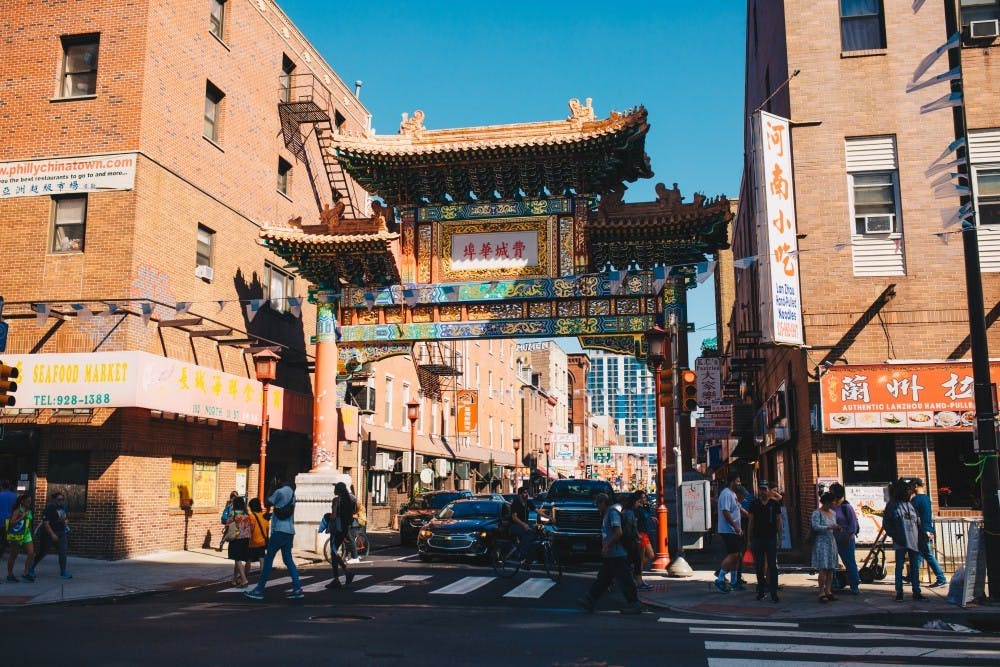
Spanning from 10th Street to 11th Street, the location of the newly proposed 76ers stadium is a block away from the Chinatown Friendship Gate.
Credit: Ethan WuThe Philadelphia 76ers are preparing to build a new stadium in Center City, prompting gentrification concerns among local activists and members of the adjacent Chinatown community.
76ers management announced on July 21 plans to build a stadium on part of Philadelphia's Fashion District, following the team's lease with Wells Fargo Center ending in 2031 – the current home stadium of the professional basketball team. Spanning from 10th Street to 11th Street, the location is a block away from the Chinatown Friendship Gate, the entrance to the Chinatown neighborhood.
In opposition to the proposal, Asian Americans United – an organization founded to encourage "people of Asian ancestry in Philadelphia [to] exercise leadership to build their communities and unite to challenge oppression" – said in a press statement a coalition is forming to resist the proposed stadium right next to Chinatown.
Debbie Wei, a founder of Asian Americans United in 1985, organized against the proposed Phillies stadium in 2000 and casino in 2008 near Chinatown. Both proposals were ultimately defeated, but Wei now finds herself in a new battle against the proposed 76ers arena.
Wei is concerned about an increase in already-high housing costs for Chinatown residents as the arena may contribute to a gentrifying part of the city.
“[Housing costs have] risen quite a bit. Gentrification has hit Chinatown hard,” Wei told The Daily Pennsylvanian. “A lot of folks have been moving up toward the northeast of Philadelphia because they can’t find affordable housing.”
76 Devcorp, a new development company created by the team, is led by David Adelman, CEO of Campus Apartments – a housing company with ties to Penn. As chairman, Adelman will be working with managing partners of the 76ers and Wharton graduates Joshua Harris and David Blitzer on erecting the stadium.
In a statement on the developers' website, the group writes regarding gentrification, “Our goal for the arena is to work together with the surrounding communities to make sure we effectively preserve things like the affordability, character and culture of the neighborhood and ensure the project benefits everyone." The message also states that the group will propose a Community Benefits Agreement that could result in programs that promote local businesses and housing affordability to benefit the local neighborhood.
Developers claim the new project is not eliminating any residential space, but rather is “proposing to replace one entertainment complex with another, and will not displace any residents in Chinatown."
Inspired by the success of other downtown urban arenas like Madison Square Garden in New York City, developers plan to build from 10th-11th Streets on Market Street. The proposal relies on public transportation which Wei described as a concern for Chinatown residents because Chinatown is already facing overcrowding of residents and tourists.
“If you're going to Chinatown any day of the week, but mostly on the weekends… It's packed. It is the most crowded community in Philadelphia by far,” Wei said.
Developers of the arena are in the process of receiving entitlements and approvals in order for the stadium to come to fruition. Philadelphia city government is among likely actors in approving or disapproving ordinances and zoning – including City Council member Helen Gym, the first Asian American woman to serve in Philadelphia's City Council. Before taking office, Gym demonstrated against the proposed Phillies stadium near Chinatown.
“Projects of this scale must be developed in partnership with communities — especially when they are growing like Chinatown is. They ignore this community at their own risk. Whatever the Sixers do, they must pay for it themselves and continue to contribute and give back to a city and fan base that is the best in the nation,” said council member Helen Gym in a statement to the DP.
“My focus is making sure the city supports and nurtures the mixed-income, residential, small business-friendly communities like Chinatown which anchor families and grow our city,” Gym said.
The Daily Pennsylvanian is an independent, student-run newspaper. Please consider making a donation to support the coverage that shapes the University. Your generosity ensures a future of strong journalism at Penn.
Donate







